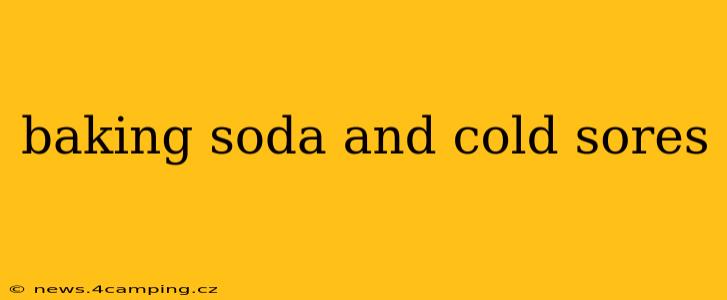Cold sores, those pesky blisters caused by the herpes simplex virus (HSV-1), can be incredibly uncomfortable. While there's no cure, many seek natural remedies to ease symptoms and speed healing. Baking soda is one such remedy, often touted for its potential to dry out cold sores and reduce pain. But does it actually work? Let's explore the evidence and delve into what science says about using baking soda for cold sores.
Does Baking Soda Help Cold Sores?
Baking soda's potential benefit lies in its alkaline nature. The slightly basic pH can help neutralize the acidic environment often associated with cold sores, potentially reducing inflammation and discomfort. Many people report anecdotal success, claiming that a baking soda paste helps to dry the sore and accelerate healing. However, it's crucial to understand that baking soda doesn't kill the virus itself. It simply addresses some of the symptoms.
How to Use Baking Soda for Cold Sores (If You Choose To)
If you decide to try baking soda, it's important to do so correctly to minimize irritation. Here's a common method:
- Mix a paste: Combine baking soda with a small amount of water to create a thick paste. Avoid using too much water, as a watery paste can be less effective and potentially spread the virus.
- Apply the paste: Gently apply the paste to the cold sore using a clean finger or cotton swab. Avoid rubbing vigorously, as this can worsen irritation.
- Let it dry: Allow the paste to dry completely.
- Rinse and repeat: Repeat this process several times a day, ensuring you wash your hands thoroughly before and after each application.
Important Note: Always test a small area of skin first to check for any allergic reactions before applying to the cold sore itself.
Can Baking Soda Make Cold Sores Worse?
While generally considered safe for topical application, baking soda can sometimes cause irritation, especially if used excessively or on sensitive skin. If you experience increased burning, stinging, or redness, discontinue use immediately. The alkaline nature of baking soda can potentially dry out the surrounding skin, potentially leading to cracking and discomfort. Moderation is key.
What are Other Home Remedies for Cold Sores?
Many people explore various home remedies to manage cold sore symptoms. While baking soda is one option, others include:
- Lysine: This amino acid is sometimes suggested as a way to combat cold sores, though scientific evidence supporting its effectiveness is limited.
- Ice packs: Applying ice can help reduce swelling and numb the area, providing temporary relief.
- Over-the-counter creams: Numerous topical creams containing antiviral agents or analgesics are available to alleviate symptoms.
What is the Best Treatment for Cold Sores?
The most effective treatment for cold sores is often antiviral medication prescribed by a doctor. These medications can shorten the duration of an outbreak and reduce its severity. For recurrent outbreaks, your doctor might suggest preventative medication.
Is Baking Soda a Cure for Cold Sores?
No, baking soda is not a cure for cold sores. It doesn't eliminate the herpes simplex virus. While it might offer some symptomatic relief by drying out the blister and potentially reducing inflammation, it's not a substitute for medical treatment.
When Should I See a Doctor About a Cold Sore?
Consult a doctor if:
- Your cold sores are severe or unusually painful.
- Cold sores are recurrent and frequent.
- You have concerns about the healing process.
- You experience complications like a secondary bacterial infection.
Conclusion
Baking soda might offer temporary relief from the symptoms of cold sores for some individuals. However, it's not a cure and shouldn't replace medical advice or treatment. Always consult a healthcare professional for proper diagnosis and management of cold sores, especially if outbreaks are frequent or severe. Remember to prioritize gentle care and avoid harsh treatments that could further irritate the affected area.
